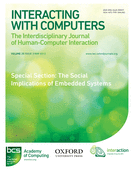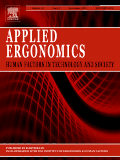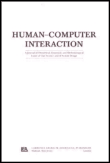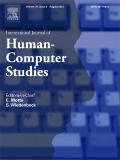
INTERACTING WITH COMPUTERS
Scope & Guideline
Bridging Disciplines for a Tech-Savvy Future
Introduction
Aims and Scopes
- Human-Computer Interaction (HCI) Research:
Focus on studying the interactions between users and computers, including usability, user experience, and the design of interactive systems. - User-Centered Design:
Emphasis on designing technologies that prioritize the needs, preferences, and behaviors of users, ensuring that systems are accessible and intuitive. - Socio-Technical Perspectives:
Investigating the interplay between technology and social contexts, particularly how digital systems impact societal norms and individual behaviors. - Emerging Technologies and Applications:
Exploration of novel computing technologies, such as AI, VR, and AR, and their implications for user interaction and experience. - Behavioral and Psychological Factors:
Analysis of how psychological principles, such as motivation and engagement, influence user interactions with technology. - Participatory and Collaborative Design:
Encouraging involvement from diverse stakeholders in the design process to create more inclusive and effective technological solutions.
Trending and Emerging
- Digital Health and Well-Being:
An increasing number of studies are examining how digital technologies can support mental health and well-being, particularly in the context of remote interactions and interventions. - AI and Conversational Agents:
There is a growing focus on the design and impact of AI-driven conversational agents, exploring their roles in various contexts, including politics, health, and education. - Youth Engagement and E-Participation:
Research on youth involvement in digital platforms and political decision-making is gaining traction, emphasizing the importance of meaningful participation in a digital age. - Virtual and Augmented Reality Applications:
The use of VR and AR for educational and therapeutic purposes is a burgeoning area of interest, indicating a shift towards immersive experiences in user interaction. - Ethics and Social Implications of Technology:
A rising trend in examining the ethical implications of digital technologies and their societal impacts, highlighting the need for responsible design practices and considerations. - Collaborative and Remote Work Solutions:
Research addressing the challenges and solutions for collaborative work in digital environments, particularly in light of the ongoing changes brought about by the COVID-19 pandemic.
Declining or Waning
- Traditional Usability Testing:
There has been a noticeable decline in research specifically focused on traditional usability testing methods, as newer, more dynamic approaches to user experience evaluation gain prominence. - Static Interface Design:
Static designs that do not account for user interaction dynamics are becoming less relevant, as there is a growing emphasis on adaptive and responsive systems. - Single-Discipline Studies:
Research that focuses solely on technical aspects of HCI without considering social or cultural implications is waning, as interdisciplinary approaches become vital. - Focus on Physical Interfaces:
Interest in physical interfaces and tangible interaction seems to have decreased, with more attention being directed towards digital and virtual interactions.
Similar Journals

APPLIED ERGONOMICS
Shaping the Future of Ergonomics with Groundbreaking ResearchWelcome to Applied Ergonomics, a premier journal dedicated to advancing knowledge and practice in the multidisciplinary field of ergonomics and human factors. Published by Elsevier Science Ltd, this esteemed journal features a diverse range of research covering critical aspects of physical therapy, human factors, safety, and engineering. With an impressive impact factor and consistently ranked in the Q1 category across multiple domains—including Engineering, Human Factors and Ergonomics, and Safety—Applied Ergonomics serves as a vital resource for researchers, professionals, and students aiming to enhance user experience and optimize workplace safety. With its extensive historical archive dating back to 1969 and continuing through 2025, this journal encourages the dissemination of innovative applications and research findings that contribute to the ergonomics body of knowledge. For those interested in cutting-edge research that directly impacts health and safety practices, Applied Ergonomics is the authoritative source.

THEORETICAL ISSUES IN ERGONOMICS SCIENCE
Connecting Theoretical Frameworks to Practical SolutionsTHEORETICAL ISSUES IN ERGONOMICS SCIENCE, published by Taylor & Francis Ltd, is an essential academic journal that delves into the complexities of ergonomics and human factors, catering to researchers and professionals in the field. With an ISSN of 1463-922X and an E-ISSN of 1464-536X, this journal has established itself as a significant contributor to scholarly discourse since its inception in 2000. Operating out of the United Kingdom, it has earned a respectable Q3 ranking in Human Factors and Ergonomics as of 2023, reflecting its impactful research contributions within the social sciences. The journal aims to foster interdisciplinary dialogue and innovation, addressing key theoretical frameworks that influence ergonomic practices and research. While offering a traditional publication model, it is committed to maintaining high academic standards, as indicated by its position in the 64th percentile among its peers, ranking #17 out of 46 within its category in Scopus. THEORETICAL ISSUES IN ERGONOMICS SCIENCE is an indispensable resource for those seeking to enhance their understanding and application of theoretical concepts in ergonomics, and a platform for disseminating cutting-edge research findings.

HUMAN-COMPUTER INTERACTION
Unleashing the Potential of Human-Computer InteractionHUMAN-COMPUTER INTERACTION is a premier academic journal published by Taylor & Francis Inc, dedicated to the interdisciplinary field of HCI, which explores the dynamic interactions between humans and computers. With its ISSN 0737-0024 and E-ISSN 1532-7051, the journal maintains a strong presence within the academic community and is recognized for its significant impact, holding a commendable impact factor that underscores its relevance. Ranked in the Q1 category for both Applied Psychology and Human-Computer Interaction, it occupies a critical position in Scopus rankings, listed as #15 in Applied Psychology and #11 in Computer Science, Human-Computer Interaction, placing it in the top 6% of relevant fields. Covering a broad spectrum of topics from usability studies to user experience design, the journal aims to facilitate innovative research and provide insights that bridge theoretical frameworks and practical applications. Published since 1985 and continuously evolving, HUMAN-COMPUTER INTERACTION remains an essential resource for researchers, professionals, and students eager to contribute to and benefit from advances in understanding how technology can effectively serve human needs.

Journal of Organizational and End User Computing
Pioneering Research in User Interfaces and Organizational PracticesThe Journal of Organizational and End User Computing, published by IGI Global, is a leading peer-reviewed outlet dedicated to exploring the intersection of organizational practices and user interfaces within the digital realm. With a robust ISSN of 1546-2234 and an E-ISSN of 1546-5012, the journal has established itself as a crucial resource for scholars and practitioners in the fields of Computer Science Applications, Human-Computer Interaction, and Strategy and Management. Recognized for its quality, the journal attained Q3 status in Computer Science Applications and Human-Computer Interaction, and Q2 status in Strategy and Management in 2023, reflecting its esteemed position in academic rankings. Operating from the heart of the United States, the journal has converged its focus from 2004 to 2024, making it a reliable source for cutting-edge research and industry trends. Although it does not offer open access, the Journal of Organizational and End User Computing remains an invaluable repository of knowledge, perfect for researchers, professionals, and students seeking to advance their understanding of organizational structures and user engagement in computing environments.

Journal on Multimodal User Interfaces
Driving Collaboration in Multimodal Interface ResearchJournal on Multimodal User Interfaces, published by Springer, serves as a vital platform for scholarly exchange in the rapidly evolving fields of Human-Computer Interaction and Signal Processing. Established in 2008 and continuing through 2024, this journal maintains a high profile in academia, currently ranking in the Q2 category for both fields, indicating its significant contribution to ongoing research and practical applications. With its Scopus rankings placing it at #34 in Signal Processing and #49 in Human-Computer Interaction, it is recognized for publishing high-quality, impactful research. Although it is not an Open Access journal, the Journal on Multimodal User Interfaces remains accessible through institutional subscriptions. Researchers, professionals, and students will find the journal an essential resource for advancing knowledge and fostering collaboration in multimodal interaction technologies, which are crucial for enhancing user experience and developing intelligent systems.

USER MODELING AND USER-ADAPTED INTERACTION
Advancing the Future of User-Centric TechnologyUSER MODELING AND USER-ADAPTED INTERACTION, published by SPRINGER, stands as a pivotal journal within the realms of Computer Science Applications, Education, and Human-Computer Interaction. With an ISSN of 0924-1868 and an E-ISSN of 1573-1391, this journal has established a reputable presence since its inception in 1991, continuing to contribute to the scholarly discourse through 2024. With an impressive impact factor reflective of its high visibility, it is ranked in the top quartiles, notably Q1 in both Computer Science Applications and Education, and Q2 in Human-Computer Interaction as of 2023. This positions the journal within the 95th percentile in Social Sciences Education and the 81st percentile in Human-Computer Interaction. As it encompasses a broad scope that integrates user modeling techniques with adaptive interaction strategies, the journal caters to the needs of researchers, professionals, and students keen on advancing knowledge in adaptive technology, educational tools, and user-centric design. While not currently open access, it remains a valuable resource for anyone interested in the intersection of user experience and technological adaptation.

INTERNATIONAL JOURNAL OF HUMAN-COMPUTER STUDIES
Bridging the Gap Between Users and MachinesINTERNATIONAL JOURNAL OF HUMAN-COMPUTER STUDIES, published by Academic Press Ltd - Elsevier Science Ltd, stands at the forefront of research dedicated to the dynamic interplay between humans and technology. With a remarkable impact factor reflective of its rigorous academic standards and its prestigious ranking in the Q1 category across vital disciplines such as Education, Engineering, Human Factors and Ergonomics, and Human-Computer Interaction, this journal serves as an essential resource for researchers, professionals, and students alike. Spanning from 1994 to 2024, it showcases pioneering studies that contribute significantly to the understanding of cognitive processes, usability, and the evolving role of technology in society. Despite the absence of Open Access options, access to this journal is facilitated through institutional subscriptions, ensuring that critical findings and advancements are readily available to a global audience. By continuing to publish high-quality research, the INTERNATIONAL JOURNAL OF HUMAN-COMPUTER STUDIES plays a crucial role in advancing the field, fostering innovation, and guiding future research directions.

Journal of Usability Studies
Exploring the intersection of technology and user satisfaction.The Journal of Usability Studies, published by the USERS EXPERIENCE PROFESSIONAL ASSOCIATION, is a pivotal platform for researchers and professionals dedicated to advancing the field of usability and user experience design. With an ISSN of 1931-3357, this journal offers a collection of peer-reviewed articles that explore innovative methodologies, emerging technologies, and applied research in usability studies. Though it operates under a traditional access model, the journal remains dedicated to fostering a detailed understanding of how users interact with systems and products. The Journal of Usability Studies is instrumental for those aiming to enhance user satisfaction through research-backed insights, making it a vital resource for academics, practitioners, and students seeking to contribute to the evolving discourse in human-computer interaction and usability engineering.

International Journal of Information Technology and Web Engineering
Fostering Collaboration in the Digital EraInternational Journal of Information Technology and Web Engineering, published by IGI GLOBAL, is a pivotal platform for the dissemination of cutting-edge research in the fields of information technology and web engineering. With its ISSN 1554-1045 and E-ISSN 1554-1053, this journal has been effectively contributing to the academic landscape since its inception in 2006, aiming to bridge theoretical frameworks and practical applications in an increasingly digital world. As a recognized Q3 journal in the realm of Computer Science (miscellaneous), it ranks 122 out of 232 in Scopus' classification, positioning it amidst the active discussions and developments within the IT and web engineering communities. The journal not only serves as an invaluable resource for researchers and educators but also encourages students and practitioners to explore innovative methodologies and technologies that shape the future of the digital landscape. Although it is not currently an open-access journal, its contributions are indispensable for advancing knowledge and fostering collaboration within the global research community.

Frontiers in Computer Science
Exploring innovative horizons in computer science research.Frontiers in Computer Science is a premier open-access journal published by Frontiers Media SA that has rapidly established itself as a prominent platform for scholarly research in the diverse and evolving field of computer science. With a notable impact factor reflecting its high citation rates, this journal aims to disseminate innovative findings and groundbreaking studies across multiple subdisciplines, including Computer Science Applications, Computer Vision and Pattern Recognition, and Human-Computer Interaction. Since its inception in 2019, and with a consistent trajectory from 2019 to 2024, it has garnered accolades, achieving Q2 ranking in several categories and an impressive Q1 in miscellaneous areas of computer science. Researchers, professionals, and students alike are encouraged to contribute to this dynamic journal that serves as a vital resource for advancing knowledge and fostering collaborative dialogue in the global computer science community. Frontiers in Computer Science is committed to providing open access to research, promoting unrestricted sharing of ideas and fostering innovation at the intersection of technology and society.